|
De Zuid-Afrikaanse schrijver André Brink werd geboren op 29 mei 1935 in Vrede. Zie ook mijn blog van 29 mei 2007 en ook mijn blog van 29 mei 2008.en ook mijn blog van 29 mei 2009 en ook mijn blog van 29 mei 2010.
Uit: A dry white season
It all really began, as far as Ben was concerned, with the death of Gordon Ngubene. But from the notes he made subsequently, and from newspaper cuttings, it is obvious that the matter went back much further. At least as far as the death of Gordon's son Jonathan at the height of the youth riots in Soweto. And even beyond that, to the day, two years earlier -- represented in Ben's papers by a receipt with a brief note scribbled on it when he'd started contributing to the schooling of the then fifteen year old Jonathan.
Gordon was the black cleaner in the school where Ben taught History and Geography to the senior classes. In the older journals there are occasional references to "Gordon N." or just "Gordon"; and from time to time one finds, in Ben's fastidious financial statements, entries like "Gordon -- R5.oo"; or "Received from Gordon (repayment) -- R5.00", etc. Sometimes Ben gave him special instructions about notes on his blackboard; on other occasions he approached him for small personal jobs. Once, when some money disappeared from the classrooms and one or two of the teachers immediately blamed Gordon for it, it was Ben who took the cleaner under his wing and instituted inquiries which revealed a group of matric boys to be the culprits. From that day Gordon took it upon himself to wash Ben's car once a week. And when, after Linda's difficult birth, Susan was out ofaction for some time, it was Gordon's wife Emily who helped them out with housework.
As they came to know each other better Ben discovered more about Gordon's background. As a young boy he had arrived from the Transkei with his parents when his father had found employment in the City Deep Mine. And since he showed interest in reading and writing from an early age he was sent to school -- no cheap or easy undertaking for a man in his father's position. Gordon made steady progress until he'd passed Standard Two, but then his father died in a rockfall in the mine and Gordon had to leave school and start working to supplement his mother's meagre income as a domestic servant.
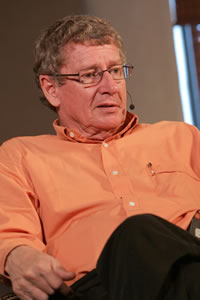
André Brink (Vrede, 29 mei 1935)
De Catalaanse dichter, schrijver en vertaler Eduard Escoffet werd geboren op 29 mei 1979 in Barcelona in 1979. Zie ook mijn blog van 11 juni 2009 en ook mijn blog van 29 mei 2010.
there is the woman
there is the woman that listens to you and there is the other.
there is the woman that, with the night, dulls the moon and you find her, and there is the other.
there is the woman that you see
and the other. and the one you would like to see... and the other.
there is the woman, you seem to remember, that made you lose
sight of the world and there is the other. then too
there is the woman that makes you forget her and the other, she does too.
there is the woman and the wind, at leisure, that are speech
and are words and a dream that walks. and flies. and the other.
there is the woman that you would like to know and the other.
there is the other and the woman you do not remember.
there is the woman and the other that you would like
to forget. there is the woman without eyes, that are
the barrels of wine in the dark of a sailboat that
has done with the sea and has told you that mermaids
she has not seen. the other neither. and there is the woman
that will cry that she has not touched the fire,
that has her eyes covered and there is the other,
whose eyes you have covered, and you too have
your eyes pulled from their sockets between the mirror
and the light of the sun. there is the woman that mutters
and there is the other. there is the woman that hangs out the washing
or arranges the fragility of the world and there is the other.
there is the woman, made flesh, that is in the light and is in the dark
and there is the other, in the dark and in the light.
there is the woman and the sex. the sex, too. and the other.
Vertaald door Graham Thomson
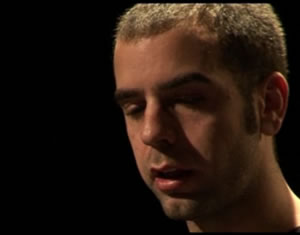
Eduard Escoffet (Barcelona, 29 mei 1979)
De Engelse letterkundige, schrijver en journalist Gilbert Keith Chesterton werd geboren in Londen op 29 mei 1874. Zie ook mijn blog van 29 mei 2007 en ook mijn blog van 29 mei 2008 en ook mijn blog van 29 mei 2009 en ook mijn blog van 29 mei 2010.
Uit: Father Brown. The Essential Tales
It is due to him to say that his fantastic physical strength was generally employed in such bloodless though undignified scenes; his real crimes were chiefly those of ingenious and wholesale robbery. But each of his thefts was almost a new sin, and would make a story by itself. It was he who ran the great Tyrolean Dairy Company in London, with no dairies, no cows, no carts, no milk, but with some thousand subscribers. These he served by the simple operation of moving the little milk cans outside peoples doors to the doors of his own customers. It was he who had kept up an unaccountable and close correspondence with a young lady whose whole letter-bag was intercepted, by the ex- traordinary trick of photographing his messages infinitesimally small upon the slides of a microscope. A sweeping simplicity, however, marked many of his experiments. It is said that he once repainted all the numbers in a street in the dead of night merely to divert one traveller into a trap. It is quite certain that he invented a portable pillar-box, which he put up at corners in quiet suburbs on the chance of strangers dropping postal orders into it. Lastly, he was known to be a startling acrobat; despite his huge figure, he could leap like a grasshopper and melt into the tree-tops like a monkey. Hence the great Valentin, when he set out to find Flambeau, was perfectly aware that his adventures would not end when he had found him.
But how was he to find him? On this the great Valentins ideas were still in process of settlement.
There was one thing which Flambeau, with all his dexterity of disguise, could not cover, and that was his singular height. If Valentins quick eye had caught a tall apple-woman, a tall grenadier, or even a tolerably tall duchess, he might have arrested them on the spot. But all along his train there was nobody that could be a disguised Flambeau, any more than a cat could be a disguised giraffe. About the people on the boat he had already satisfied himself; and the people picked up at Harwich or on the journey limited themselves with certainty to six.
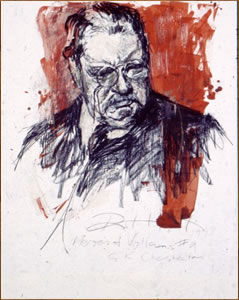
G. K. Chesterton (29 mei 1874 - 14 juli 1936)
Portret door Drew Hewitt
De Hebreeuwse dichteres, schrijfster en letterkundige Leah Goldberg werd geboren in Königsberg (Pruisen) op 29 mei 1911. Zie ook mijn blog van 29 mei 2007 en ook mijn blog van 29 mei 2008 en ook mijn blog van 29 mei 2009 en ook mijn blog van 29 mei 2010.
Uit: PRAYERS OF ATONEMENT
You came to me to open my eyes,
your body a glance a window a mirror,
you arrived as night comes to the owl
to show him in darkness all necessary things.
And I learned: a name for every eyelash and nail
for every hair on flesh uncovered, made light,
and the fragrance of childhood, of resin and pine,
was the sweet fragrance of our bodies' night.
If there were torments then they voyaged toward you
my white sail on course toward your dark night.
Now, allow me to leave, let me go, let me go
to bow on the shores of forgiveness.
Vertaald door Rachel Tzvia Back
Der morgige Tag
Heute ist das Grün sehr grün.
Und das Grau sehr grau.
Ein wenig Schwarz, und kein Weiß in der Stadt.
Heute ist der Verstörte sehr verstört.
Heute ist die Vergangenheit sehr vergangen.
Ein wenig Zukunft. Und keine Gegenwart in der Luft.
Und noch ist es nicht leicht zu atmen, und noch ist es nicht leicht
Gegen den durchtriebenen Wind zu denken.
Und es fällt gar nicht leicht zu warten.
Und der Sturm berührt die Augenwimpern,
und in tausend Stücke zerbricht jeder Augenblick.
Aber heute ist das Grün sehr grün.
Vertaald door Elad Klein
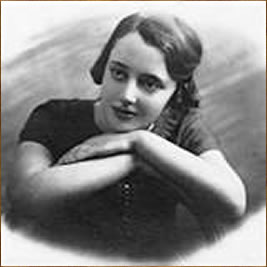
Leah Goldberg (29 mei 1911 15 januari 1970)
Getekend door Yarival
De Iraanse filmregisseur en schrijver Mohsen Makhmalbāf werd geboren op 29 mei 1957 in Teheran. Zie ook mijn blog van 29 mei 2010.
Uit: Houra (nymph, script)
Airport, daytime:
A plane lands. Teenage dark-skinned porters holding their carts, wait to rush towards passengers stepping out of the plane. Among them, a weary old woman called Houra comes down the stairs. A flight attendant holds her arm, helping her down. Shanbeh, one of the teenage porters, spots Houra and goes toward her.
On the streets, daytime:
Houra sits on Shanbehs cart, wearing a ring of thread on each finger. Each thread acts as a reminder to buy something. Houra asks Shanbeh to take her to the bazaar, so she can buy herself the furniture she needs. Shanbeh asks her what she wants to buy. After consulting the threads on her hand, the old woman says, A refrigerator. Shanbeh turns the cart around and says, Then, we should go in the other direction.. Houra adds that she needs a washing machine as well. Shanbeh changes direction one more time and explains that they need to go to different places for each item she intends to buy. He asks to know what else Houra wants to buy, and after a thorough examination of the threads on her finger, Houra replies A bed, a dressing table,
, but then tells Shanbeh how shed prefer to have a cup of tea first. She takes out a teapot from her things, hands it over to Shanbeh telling him what a good time theyd have were he to light a fire so they could have some tea. Shanbeh makes a small pile of wood, fills the teapot with water, and puts on the fire he makes. He asks the old woman who all that furniture is for, and she tells him that its for herself. Shanbeh asks her why she wants all that stuff at this stage in her life, while she might not have long left. Houra recounts how she always wished to buy them buy never had the money, and in answer to Shanbehs question of Where she got it from tells him of the inheritance she received. She then remembers she has forgot to leave food and water for her rooster at home and that the rooster could well die were she not to hurry back home. She suggests leaving the tea to later and going after the furniture before its late.
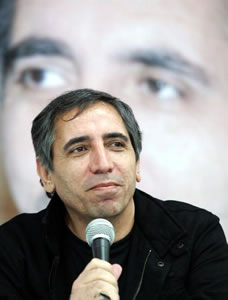
Mohsen Makhmalbāf (Teheran, 29 mei 1957)
De Oostenrijkse schrijver en theatercriticus Hans Weigel werd geboren op 29 mei 1908 in Wenen. Zie ook mijn blog van 29 mei 2009 en ook mijn blog van 29 mei 2010.
Gebundene Hände
Jedes Mal, jedes Mal, schwört man sich zu,
das ist das letzte Rendezvous.
Doch man weiß, jedes Mal, dass man s nicht tut,
hat man denn das Herz dazu.
Zarah Leander
Gebundene Hände, das ist das Ende,
jeder verliebten Passion.
Es spricht noch der Blick,
von Liebe und Glück,
und doch, weiß das Herz nichts mehr davon.
Man sagt gern: verzeih,
so geben wir uns frei,
du fühlst doch auch wie ich,
es ist vorbei.
Und doch, ohne Ende,
tragen die Hände,
Fesseln; der Liebe Sklaverei.
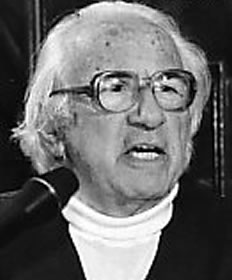
Hans Weigel (29 mei 1908 12 augustus 1991)
Zie voor nog meer schrijvers van de 29e mei ook mijn vorige blog van vandaag.
29-05-2011 om 07:36
geschreven door Romenu 
Tags:André Brink, G. K. Chesterton, Eduard Escoffet, Leah Goldberg, Mohsen Makhmalbā,f, Hans Weigel, Romenu
|

